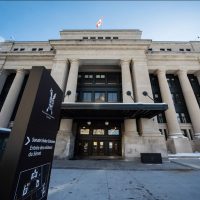News
Senator Harder stepping down as Government Representative in the Senate
Appointed in March 2016, Senator Harder intends to continue representing Ontario as an independent Senator.
Senator Peter Harder is handing the reins to a new Government Representative in the Senate in the new year, after managing Government business in the Upper Chamber during a four-year period of profound change.
Sen. Harder informed Prime Minister Justin Trudeau of his decision to step down, effective December 31, 2019.
“The start of a new Parliament is the best time to welcome a new face in the role of Government Representative,” he said. “With the Senate now well advanced on the path to becoming the more independent and less partisan institution we are seeking to achieve, it simply made sense for me to pick this moment: a new cabinet has been sworn in; new Senate groups are emerging along non-partisan lines; and new leadership teams are joining the negotiating table.”

Senator Peter Harder is stepping down as the Government Representative in the Senate.
Sen. Harder said the tasks of nurturing a more cooperative culture, as well as establishing a new approach for the Government to shepherd legislation through the Senate – with an open-by-default office working closely with non-partisan sponsors – are being accomplished thanks to the many devoted to Senate reform.
“While we have much left to accomplish, I do believe we have established a strong template for the future,” Sen. Harder said. “I am hopeful this is something that those who follow can build on.”
Sen. Harder is the first to be styled Government Representative, rather than Government Leader in the Senate, in order to reflect the Government’s goal of transforming the Senate into a more independent and less partisan institution. In contrast with past government leaders, the Government Representative does not lead a partisan caucus of senators affiliated to the governing party.
The heart of Sen. Harder’s mandate in the role was to manage the Government’s legislative agenda during the uncharted territory of the 42nd Parliament.
“The achievement of the Government’s legislative agenda in the last Parliament was facilitated by a widely shared understanding among senators of what the founders of Canada intended when they tasked an appointed Senate with sober second thought, including the cardinal principle of deference to the elected House of Commons. Also crucial to the outcome were a diplomatic spirit of negotiation among Senate leaders and the openness of the Government to consider – and often accept – thoughtful legislative changes proposed by the Senate,” Sen. Harder said.
Sen. Harder thanked Prime Minister Trudeau for his confidence and trust, as well as his unwavering commitment to fostering a Senate that fulfils its role of sober second thought more effectively. “It has been an honour to serve Prime Minister Trudeau’s government in this role,” Sen. Harder said.
“It has been an honour to serve Prime Minister Trudeau’s government in this role,” Sen. Harder said.
The Government kick-started a positive sea change in the political culture of the Senate when it took bold action with a new appointment process free of patronage and partisanship, Sen. Harder said.
By more consistently applying a non-partisan lens to its careful review of legislation, the Senate is improving its standing with Canadians and increasing the credibility of the parliamentary process as a whole, he said, highlighting that the Government accepted Senate amendments to one third of its bills last Parliament.
Senate reform has enabled improved policy outcomes for Canadians in a diverse array of fields, from criminal justice to Indigenous reconciliation to federal-provincial relations.
“As a result of the Prime Minister’s leadership and the hard work of senators appointed over the course of many governments, the Senate is now in a better position to fulfill its duty to defend the underrepresented, the rights of minorities and the regions. The days of the partisan echo chamber are over and we should not go back,” he said.
Sen. Harder thanked Senator Diane Bellemare, former Legislative Deputy, Senator Grant Mitchell, Government Liaison, and the staff of the Government Representative Office. “If Senators Bellemare and Mitchell and the GRO staff had not shared this task with me, the job would, frankly, have been impossible,” he said.
Sen. Harder also expressed gratitude to current and former Senate leaders and facilitators, who worked in a collegial fashion to make the Senate work, including Senators Yuen Pau Woo, Don Plett, Scott Tannas, Joseph Day, Larry Smith, Claude Carignan and Elaine McCoy.
“If there is one piece of advice I would leave behind for all Senate leadership, it is this: build bridges, not walls. All Senate leaders will have their own perspectives, but we share a collective duty to Canadians to make the institution work – not just for our own caucuses or groups, but for everyone.”





















































